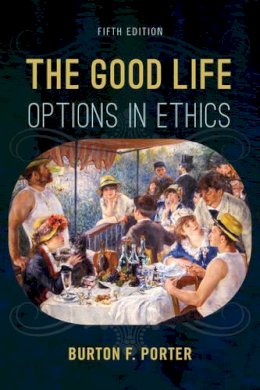
Stock image for illustration purposes only - book cover, edition or condition may vary.
The Good Life: Options in Ethics
Burton F. Porter
€ 88.45
FREE Delivery in Ireland
Description for The Good Life: Options in Ethics
paperback. Intended for use in the introduction to ethics course, this text is designed to engage today's practical-minded student in more fundamental questions. The book ranges from ideals in living to contemporary moral problems, exploring and analyzing both areas in order to stimulate deeper reflection. Num Pages: 312 pages. BIC Classification: HPQ; HPS; JFM. Category: (UU) Undergraduate. Dimension: 229 x 152. .
Intended for use in the introduction to ethics course, The Good Life: Options in Ethics, Fifth Edition is designed to engage today's practical-minded student in more fundamental questions. The book ranges from ideals in living (the good) to contemporary moral problems (the right), exploring and analyzing both areas in order to stimulate deeper reflection. The first section of the book clears away the obstacles to pursuing ethical understanding - relativism, determinism, and egoism. Then traditional definitions of the good life are discussed, theories such as hedonism, self-realization, duty, evolutionism, religious ethics, and virtue ethic. The final section addresses today's social problems including abortion, euthanasia, animal welfare, capital punishment, and sexual morality. New to the Fifth Edition: Chapter 6, Following Nature, has been eliminated, and its contents have been integrated into appropriate chapters New section entitled Contemporary Moral Issues includes new chapters on: Contraception and Abortion Punishment and the Death Penalty Sexual Ethics The Natural Environment Racism and Sexism An Instructor's Manual and Test Bank now accompany the text
Product Details
Format
Paperback
Publication date
2017
Publisher
Rowman & Littlefield United States
Number of pages
312
Condition
New
Number of Pages
312
Place of Publication
Lanham, MD, United States
ISBN
9781442272552
SKU
V9781442272552
Shipping Time
Usually ships in 15 to 20 working days
Ref
99-2
About Burton F. Porter
Burton Porter received his Bachelor's degree from the University of Maryland and his Ph.D. from St. Andrews university, Scotland, with graduate study at Oxford University. He has taught at various institutions including Russell Sage College and Drexel University, and he has held positions as Department Chair and Dean of Arts and Sciences. At present he is Professor of Philosophy at Western New England University, having taught previously as Visiting Professor at Mount Holyoke College. He received the award of Outstanding Educator of America. In addition to The Good Life, Burton Porter is the author of several other academic works, as well as novels, plays, and children's poetry. His books include The Great Perhaps, What the Tortoise Taught Us, Philosophy through Film, The Head and the Heart, The Voice of Reason, Philosophy through Fiction and Film, Religion and Reason, Personal Philosophy, Reasons for Living, Philosophy: A Literary and Conceptual Approach, and Deity and Morality.
Reviews for The Good Life: Options in Ethics
“Much more than a standard text on normative theories, this book lends itself to a thorough introductory examination of the field of ethics. . . . In particular, the evaluation discussions are excellent, as they draw attention to problems in the theories and arguments in a way that aids in teaching students to craft arguments themselves. Too many students think it is sufficient to disagree. The evaluation sections help focus how to critically examine a theory.”
Stevens F. Wandmacher, University of Michigan-Flint “The writing style of the text is, I think, appropriate for undergraduates as well as most graduate students. The style is clear, crisp, and avoids unnecessary and misleading verbiage. . . . [A] logically organized sequence of ‘obstructions’ to ethical theory by presenting the notions of egoism, determinism, and relativism early in the text.”
Joseph F. Marino, Hofstra University
Stevens F. Wandmacher, University of Michigan-Flint “The writing style of the text is, I think, appropriate for undergraduates as well as most graduate students. The style is clear, crisp, and avoids unnecessary and misleading verbiage. . . . [A] logically organized sequence of ‘obstructions’ to ethical theory by presenting the notions of egoism, determinism, and relativism early in the text.”
Joseph F. Marino, Hofstra University
